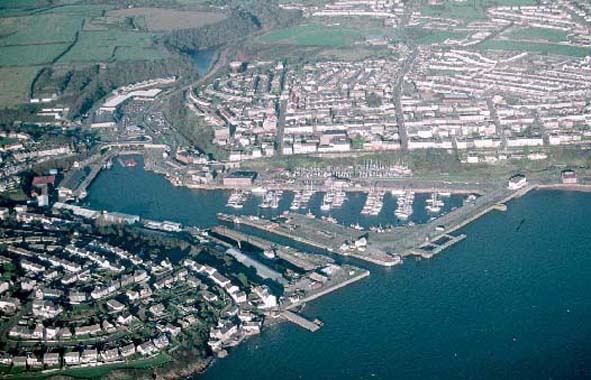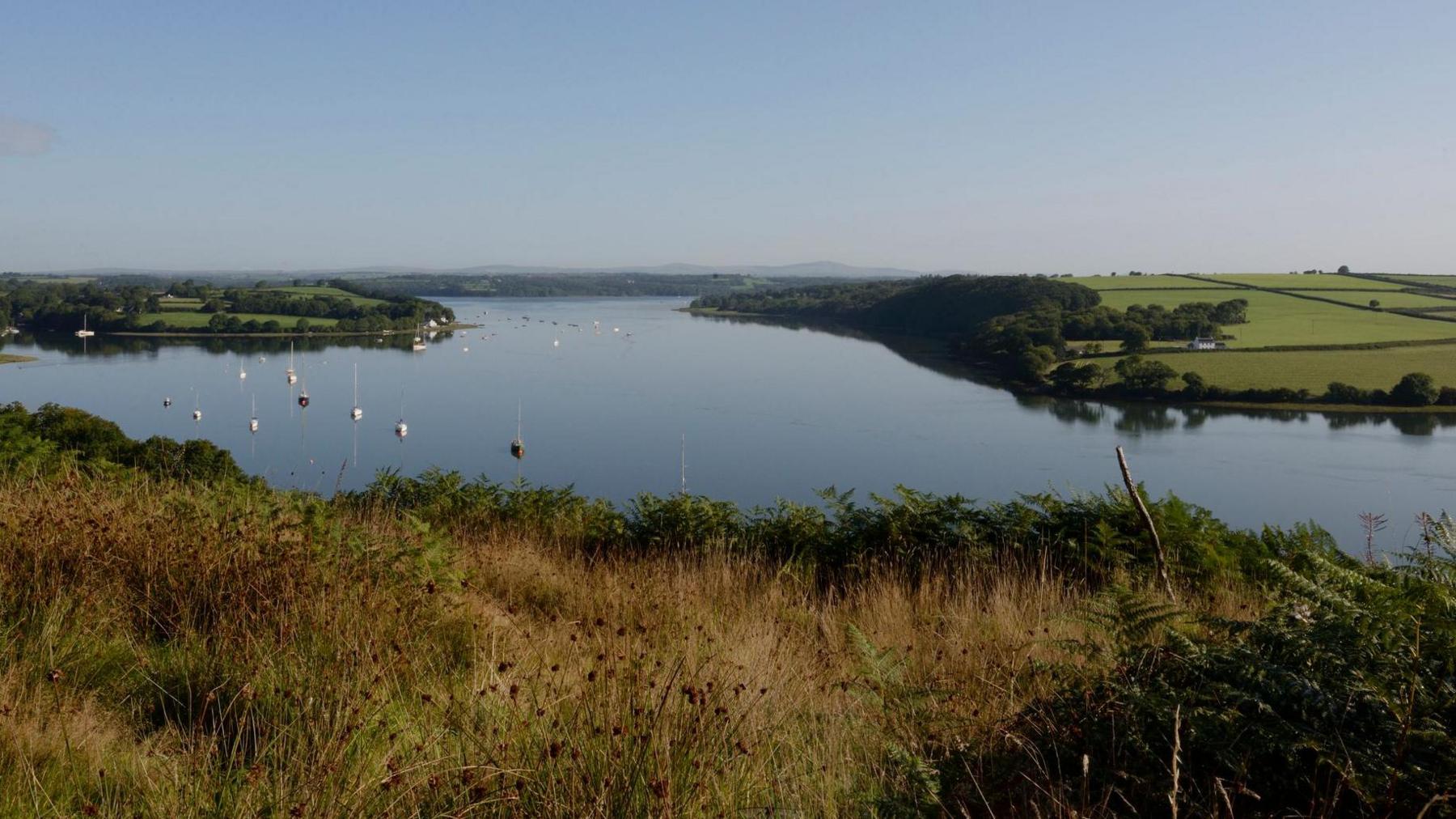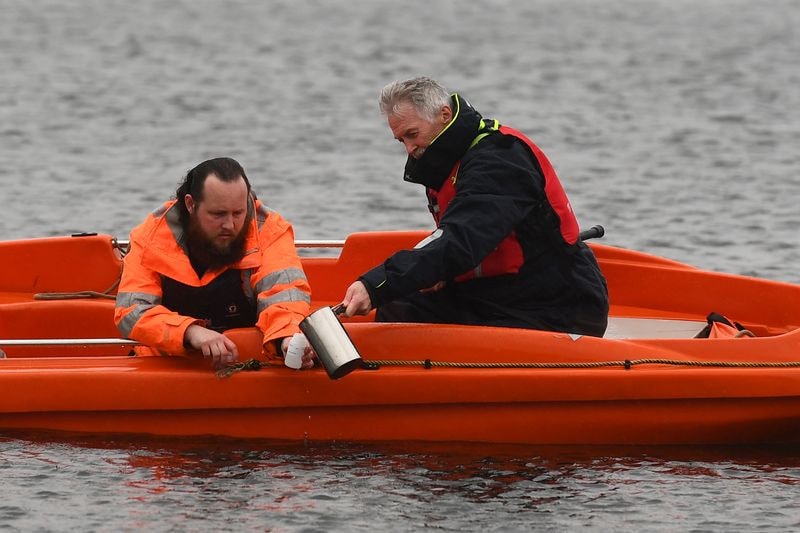News
Doubts raised over feasibility of Milford docks master plan

 The Herald reported last month that Milford Haven Port Authority has unveiled a new £60 million Milford Dock Master plan is to radically change and regenerate “Wales’ largest fishing port”.
The Herald reported last month that Milford Haven Port Authority has unveiled a new £60 million Milford Dock Master plan is to radically change and regenerate “Wales’ largest fishing port”.
Details unveiled by the plan aim to create a high quality brand for its fish and other seafood. Part of the £60 million development aspires to transform the entire area around Milford Fish docks and the plan claims that this will bring further growth and job opportunities. The intention is to provide high standard storage, processing, retail and tourism facilities for the area, in order that ‘seafood caught in Pembrokeshire can be promoted as a brand to be sought after’.
Milford Haven was once one of the busiest ports in the UK and has even inspired writers such as Shakespeare who used Milford as a setting in the play Cymbeline referring to the location as ‘this same blessed Milford’. Lord Admiral Horatio Nelson said of Milford Haven, ‘It is one of the greatest harbours in the world’.
Having one of the deepest natural waters of any harbour in the world, Milford became home to a thriving and important fishing port during the 19th century and throughout the first half of the 20th century boasted a busy and bustling fishing port quayside. At one point, for every one job at sea there were four in the port. However, a decline in the 1950’s saw the fishing industry all but disappear and the port was transformed into what is now mainly a marina.
Alun Davies, Assembly Minister for Natural Resources and Food, is quoted in the web article as saying that, ‘The success of our proposed plan relies upon our ability to work in partnership with the Welsh fishing industry’. He also says that he hopes the plans announced will ‘help strengthen the local fishing industry and bring employment opportunities to the area’.
Kevin Hobbs added to this optimism by stating that he believes the Milford Fish docks have huge potential. He suggests that greater tonnages of fish could be handled there given the range of ‘quality and diverse species’ available in Pembrokeshire fishing waters. He goes on to applaud the plan’s aim to create wholesale and retail outlets, along with facilities for processing catch that is landed on the quay, which he sees as crucial in creating jobs and encouraging growth.
However, The Herald spoke exclusively to one local fisherman, who wished to remain unnamed, and who cast serious doubt over the viability of these ambitious plans.
“I believe this is just a way of getting grant money. Half of what they are saying might not happen. In my case, I have a shed on the quay for which I have been asking for a drainer for over eighteen months now. The public are even complaining about the smell and yet nothing has been done. We have a similar problem with getting ice which is really expensive.”
He went on to say that the fishermen who use the port find it very hard to obtain fuel which, he claims, is only available during ‘normal’ working hours and which, he says,‘would be available round the clock in any other port’, stating, “There is nothing here for fishermen”.
On the subject of Kevin Hobbs’ vision of greater fish quantities being handled at the port he pointed out that,
“Fish couldn’t be caught locally because of the fishing quotas. Under the new European rule (EU Fisheries) called ‘Kilowatt Days’ we are only allowed to fish a certain amount of days per year. So where is all this fish going to come from? If there are such good fishing stocks here, then why aren’t the fishermen here?”
He was also sceptical of the Port Authority’s ability to ‘get things done’ as he said that there wasn’t even anywhere for local fisherman to lift their boats in order to complete paint work, along with the lack of crane facilities available for them to use. He asked who would really benefit from the plans? He implied that only the port authority, rather than the local fishermen, would reap the rewards. He believes that of the £60 million the local fishermen would be lucky to receive two million pounds, the rest, he thinks, being spent on the port.
He pointed out that: “There are not enough fishing boats here, roughly twenty to thirty little boats. There are only two big trawlers here and one big shellfish boat. This is the port in Britain with the least amount of fishing boats. Do they want fishing or not? If they do they will have to change their attitude. There is only one fish shop in Milford, which is closed on Saturdays, and this is the biggest fishing port in wales!”
He explained that the problem was largely to do with who is actually fishing from Milford Haven.
“To bring fish here, in Pembrokeshire, process it here and then take it away from here is very expensive. What is happening is that Belgium vessels, for example, are offloading produce here at port and then it goes straight onto a foreign lorry and it’s off. They don’t use local crews and even their crew changes involve men being taxied from Belgium! They aren’t even using local transport services. The food they use for their vessels is 95% brought over in the back of a lorry from Belgium. Even the fishing gear comes from Belgium. The only thing they buy here is the fuel, and that comes from the Port Authority, so how is this helping local fishermen and traders?”
The Fisherman with whom The Herald spoke also complained that he has tried approaching the Port Authority for new property and was struggling, despite several meetings with the Port Authority Committee.
What seems to be clear is that, if the Port Authority’s plans are to succeed, it will be essential for them to work with local fishermen and traders if their redevelopment is truly to benefit the local community, creating jobs in the fishing industry. From speaking with a local and busy fisherman, it seems this is not the prevailing position and more co-operation would appear to be needed if the ambitious £60million ‘master plan’ is to reach its full potential, and succeed in making Milford Haven one of the UK’s best and more productive fishing ports. Local fishermen, businesses and retailers will be waiting to see how this develops.
international news
Mandelson quits Lords amid police probe over Epstein links

Peter Mandelson has announced he will retire from the House of Lords with immediate effect, as mounting political and legal pressure grows over claims he shared sensitive government information with convicted sex offender Jeffrey Epstein.
Parliamentary officials confirmed that Peter Mandelson formally notified the Clerk of the Parliaments of his decision, ending his membership of the upper chamber from Tuesday (Feb 4).
The move follows reports that the Metropolitan Police Service is reviewing allegations of possible misconduct in public office connected to emails said to have been forwarded to Epstein while Mandelson was business secretary during the 2008–09 financial crisis.
Downing Street has confirmed that material has been passed to police after an initial Cabinet Office review.
Government fury

Prime Minister Keir Starmer told cabinet colleagues Mandelson had “let his country down”, according to No 10, and officials are now drafting legislation that could strip him of his peerage entirely.


Removing a life peer is rare and would require an Act of Parliament.
If passed, Mandelson would lose the title “Lord” altogether — an extraordinary step that has only been considered in the most serious cases.
Senior ministers have described the alleged passing-on of market-sensitive government discussions as “disgraceful” and a “betrayal of trust”.
What police are examining
Misconduct in public office is a centuries-old common law offence that applies where someone in a position of public trust wilfully abuses that role. It carries a maximum sentence of life imprisonment.
Investigators will assess whether confidential information — particularly relating to government financial policy during the crash — was shared without justification and whether safeguards were breached.
At this stage, no charges have been brought.
Mandelson has previously apologised for maintaining contact with Epstein after the financier’s conviction, saying he regrets “ever having known him”, but he has disputed some of the latest claims and has not commented directly on the police review.
Political shockwaves
Opposition parties are pushing for further disclosure of documents relating to Mandelson’s vetting and his past roles.
Conservatives are expected to force a Commons vote demanding more information, while Liberal Democrats have called for a public inquiry.
Several MPs have also suggested Mandelson should be removed from the Privy Council.
The developments mark a dramatic fall for one of Labour’s most influential political figures of the past three decades, who only months ago was serving as the UK’s ambassador to Washington.
Now, with police examining evidence and legislation being prepared to remove his title, his public career appears effectively over.
More updates are expected as the investigation continues.
Community
Cleddau at heart of major water reforms as ministers promise ‘fundamental reset’

New regulation plan aims to tackle pollution, sewage spills and ageing infrastructure
COMMUNITIES along the River Cleddau could see tighter controls on pollution and stronger oversight of water companies after ministers unveiled what they describe as a once-in-a-generation shake-up of how Wales’ water system is run.
The Welsh Government this week published a Green Paper promising cleaner rivers, tougher enforcement and a new Welsh economic regulator dedicated solely to the water sector.
Deputy First Minister Huw Irranca-Davies said it was time for a “fundamental reset” to rebuild public trust, warning that ageing infrastructure, climate pressures and growing concern about water quality meant the current system was no longer fit for purpose.
For Pembrokeshire residents, those words land close to home.

Local frustration growing
From Haverfordwest down to Milford Haven, the Cleddau is both a working waterway and a natural asset, supporting wildlife, leisure users, anglers and tourism businesses.
But in recent years there have been repeated complaints about sewage overflows, murky water after heavy rain and nutrient pollution washing in from across the catchment.
Storm discharges and wastewater treatment are the responsibility of Dŵr Cymru Welsh Water, while environmental enforcement sits with national regulators. Many locals say neither has acted quickly enough when problems arise.

Residents and river users have told The Herald they feel the estuary is “worse than it used to be”, particularly after periods of wet weather when combined sewer overflows can activate.
Concerns range from the impact on fish stocks and birds to whether the water is safe for paddleboarding, sailing and wild swimming.
What ministers are proposing
The consultation sets out plans to:
- create a new Welsh regulator focused on water
- strengthen monitoring and enforcement
- drive investment in ageing pipes and treatment works
- improve transparency and accountability
- support long-term environmental protection
Since 2022, the government says it has invested more than £56 million tackling water quality through enforcement, monitoring and nature-based solutions. A further £5 million has been earmarked next year specifically for river and coastal improvements.
Ministers say the changes should make it easier to fine or sanction poor performance and force faster upgrades where infrastructure is failing.

Why the Cleddau matters
The Cleddau catchment is one of west Wales’ most important waterways.
It feeds into the Milford Haven Waterway, a key centre for industry, energy, fishing and recreation, while also providing habitat for protected wildlife and drawing thousands of visitors each year.
Any decline in water quality has knock-on effects not just for nature but for jobs and the local economy.
Campaigners argue that without tougher oversight and sustained investment, the river risks long-term damage.
Consultation open
The Green Paper is now out for public consultation, with ministers inviting views from residents, businesses and community groups.
For many in Pembrokeshire, this may be a rare chance to push for specific improvements on their doorstep — from fewer sewage discharges to better monitoring of agricultural runoff and clearer reporting when incidents occur.
If the promised “reset” is to mean anything locally, it will be judged on one thing: whether the Cleddau actually gets cleaner.
The consultation is open on the Welsh Government website, and submissions can be made by individuals as well as organisations.
News
Davies and Morgan clash over policing powers and terror response in Senedd exchange

CONSERVATIVE MS says breaking up UK would ‘benefit criminals’ as First Minister insists Wales would still rely on cross-border co-operation
A ROW over whether policing powers should be devolved to Wales spilled onto the Senedd floor as a senior Conservative warned that separating from UK-wide structures could leave the country exposed to terrorism and serious crime.

During questions to the First Minister in Senedd Cymru, Andrew RT Davies pressed ministers on whether law and order is better delivered from Westminster rather than Cardiff Bay.
Opening the exchange, Mr Davies said that although he and the Welsh Government disagreed on where policing powers should sit, they should both accept that dismantling the United Kingdom would weaken security.
He told the chamber that if “separatists had their way and they broke up the United Kingdom, policing would be fundamentally weakened in these islands and the criminals will benefit from it”.
He asked the First Minister to agree that the UK provides the strongest framework for keeping communities safe through joint working between England, Wales, Scotland and Northern Ireland.
“The co-operative working and that strong union, working together… protects the citizens of this great country of ours,” he said, urging ministers to reject what he called a “narrow, separatist, independent argument”.

‘Strong devolution in a strong UK’
Responding, Eluned Morgan said her government was not pursuing devolution as a stepping stone to independence.
“We want to see strong devolution in a strong UK,” she said, adding that Labour remained committed to improving services rather than chasing constitutional change for its own sake.
She argued that reforming how policing is governed in Wales could improve accountability and outcomes for the public, particularly as discussions continue over replacing the current police and crime commissioner model.
“We want to see change when it comes to policing… because we want to see better provision for the people in Wales,” she told MSs.
Terrorism expertise ‘not something you could replicate’
However, the First Minister acknowledged that certain specialist capabilities, particularly counter-terrorism, would still require close links with the rest of the UK.
“It of course makes sense for us to co-operate across the border when it comes to policing, when it makes sense,” she said.
“Just think about terrorism; we’ll never have the kind of absolute expertise in terrorism that you may get in a place like London. We would have to work with them and depend on them—not something you could do in an independent Wales.”
Her comments prompted Mr Davies to argue that this reliance showed why policing should remain reserved to Westminster.
He later said the admission demonstrated “the dangers of putting the Senedd in charge of policing”, claiming Wales could end up dependent on external support during major incidents.
Long-running debate

Policing and criminal justice are among the few major public services not currently devolved to Wales, with responsibility resting with the UK Government.
Supporters of devolution, including Plaid Cymru, argue that Welsh control would allow policies better tailored to local needs.
Opponents say fragmenting the system could weaken intelligence sharing and increase costs, particularly for specialist units tackling organised crime and terrorism.
The exchange underlines how the issue remains a political dividing line in Cardiff Bay, with both sides framing the argument around public safety rather than constitutional theory.
For now, any change would require agreement from Westminster, meaning the debate is likely to continue long before any powers formally shift.
-

 Health5 days ago
Health5 days agoConsultation reveals lack of public trust in health board
-

 News6 days ago
News6 days agoCaldey still unsafe, survivors warn — despite Abbey’s reform claims
-

 Community6 days ago
Community6 days agoPembrokeshire students speak at national Holocaust Memorial Day event
-

 News4 hours ago
News4 hours agoPrincess of Wales visits historic Pembrokeshire woollen mill
-

 News6 days ago
News6 days agoKurtz raises Gumfreston flooding in the Senedd as petition deadline nears
-

 Community5 days ago
Community5 days agoCampaign to ‘save’ River Cleddau hits over 2,200 signatures
-

 Crime4 days ago
Crime4 days agoPembroke man accused of child sex offences sent to Swansea Crown Court
-

 Education6 days ago
Education6 days ago‘Vulnerable teen’ questioned by police at Milford Haven School




























